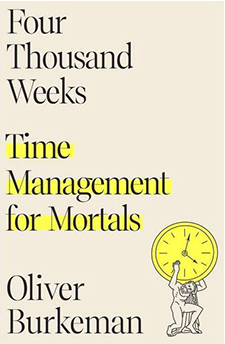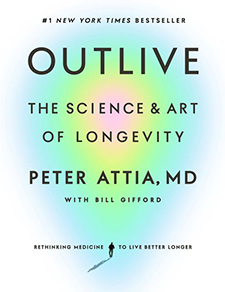Explore This Issue
December 2023What are your plans for the end of the year? If you have a little time to yourself, you might want to try one of these suggestions from the ENTtoday editorial board members. These books cover a wide range of topics, including time management, medical research, organization, and even medical fiction.
Matthew Naunheim, MD, MBA
Four Thousand Weeks: Time Management for Mortals
Oliver Burkeman; 2023, Picador Paper
 This New York Times best seller on time management takes on the familiar struggle against distraction in terms of deadlines, to-do lists, and work–life balance, but looks at it from a different angle: the challenge of how best to use the span of a human life.
This New York Times best seller on time management takes on the familiar struggle against distraction in terms of deadlines, to-do lists, and work–life balance, but looks at it from a different angle: the challenge of how best to use the span of a human life.
“The basic premise of the book is that we have only 4,000 weeks total to live—that’s the average human life span,” says Dr. Naunheim, an assistant professor in otolaryngology–head and neck surgery at Harvard Medical School and a surgeon at Massachusetts Eye and Ear in Boston. “That means 4,000 Saturdays, and 2,000 of mine are already gone even though I feel like I’m just getting started!”
Burkeman uses humor and practical insights from ancient and contemporary philosophers, psychologists, and spiritual teachers to refute the modern obsession of “getting everything done” through embracing finitude. That means highlighting that the unhelpful ways we often think about time are choices we’ve made as individuals and as a society.
“The book is about reframing your life and time,” said Dr. Naunheim. “The premise might sound a little hokey, but it’s really great.”
Timothy Smith, MD, MPH
Outlive: The Science & Art of Longevity
Peter Attia, MD; 2023, Bloomburg
 Although mainstream medicine has had many successes in healthcare, it has had challenges in making progress against diseases that kill many people, including heart disease, cancer, Alzheimer’s disease, and type 2 diabetes. Dr. Attia’s book takes a different approach to preventing chronic diseases and extending the life span.
Although mainstream medicine has had many successes in healthcare, it has had challenges in making progress against diseases that kill many people, including heart disease, cancer, Alzheimer’s disease, and type 2 diabetes. Dr. Attia’s book takes a different approach to preventing chronic diseases and extending the life span.
“It’s a health optimization book that gets into precision medicine and how it can be used to make changes to optimize one’s ‘health span’—meaning longevity with good health,” said Dr. Smith, professor and vice chair in the department of otolaryngology–head and neck surgery at Oregon Health & Science University in Portland. “You’ll find it in the self-help category.”
That self-help comes in the form of nutritional interventions, lessons on optimizing exercise and sleep, and ways to address emotional and mental health. In the book, Dr. Attia states that in order to extend longevity, actions must be personalized and people must be proactive rather than waiting to see what results might follow from faulty strategies.
Stacey T. Grey, MD
The Covenant of Water
